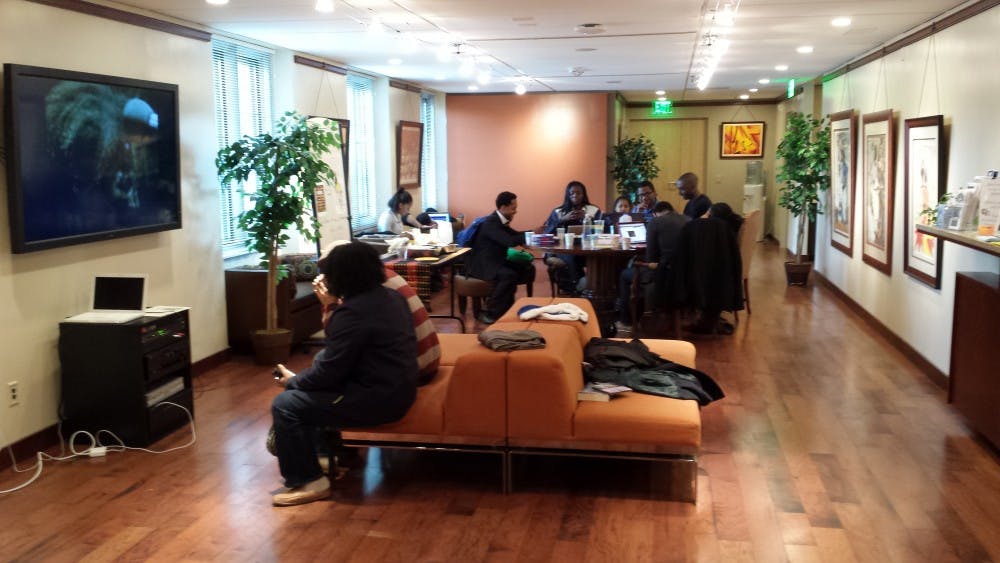What could you accomplish if you had more time to rest? Nap Ministry founder Tricia Hersey encouraged listeners to consider this question in a Black History Month keynote event hosted Sunday evening by the Mary Lou Williams Center for Black Culture.
The Nap Ministry is an organization founded in 2016 that promotes the idea that “rest is resistance,” according to its website. The organization’s philosophy—rooted in Black liberation theology, public health and Afrofuturism, among other ideologies—is based on the belief that rest is a form of resistance against “grind culture” and other byproducts of capitalism and white supremacy.
The event began with remarks from Mary Lou Center Director Dawna Jones, who discussed the legacy of the center’s namesake and highlighted the advocacy of Black students on campus. Jones noted that the 2022 Black History Month theme designated by the Association for the Study of African American Life and History is Black health and wellness and that there was “no more important speaker” than Hersey for this theme.
Abele Ambassador Vaughn Bledsoe, a first-year, introduced Hersey, a Chicago native with decades of experience in speaking, activism and poetry. Hersey received a bachelor of science in public health from Eastern Illinois University and a master of divinity from Emory University, both of which contributed to her philosophy.
“I want to start this event by saying thank you. It’s Sunday, and so much is taking our attention away, so for you to just come on and take this time to process with me is great,” Hersey said. “This is not your normal Zoom webinar. We are all Zoomed out.”
Hersey continued on to say that attendees didn’t have to sit up straight in their chairs or practice the usual Zoom etiquette, because “resting and disrupting and pushing back against grind culture’s grip on us is a lifetime practice.”
“If you’re waiting on white supremacy to tell you to slow down, that will never happen,” Hersey said. “Grind culture is a collaboration between white supremacy and capitalism.”
Hersey’s work began as an experimentation to “save [her] own life,” rooted in her understanding of cultural trauma. She said she didn’t expect anyone to attend the first Nap Ministry event, but people came. The event lasted longer than planned because people wouldn’t wake up from their naps, Hersey said, and people expressed interest in future events.
Hersey also emphasized that her ancestors played a role in how she viewed rest, including Harriet Tubman and her grandmother, Ora Caston, who was the “muse” of her work.
“Every day, my grandmother sat on her yellow plastic-covered couch and closed her eyes for 30 minutes to one hour in between two jobs, raising nine children, raising a garden, church and community,” Hersey said. “She sat, every single day, and I thought she was so eccentric. ‘Is she asleep? Is she just sitting there? Why won’t she go to bed?’”
When Hersey whispered to her cousins that grandma was sleeping, Caston would respond, “Every shut eye ain’t sleep. I’m resting my eyes. I’m listening.”
This fueled Hersey’s conviction that “resting is always available to us. It is not a luxury.”
Attendees also partook in a minute-long “rest practice,” in which the webinar was silent and viewers were encouraged to unwind. Upon reconvening, Hersey explained the tenets of the Nap Ministry, which included rest as a form of resistance against capitalism and white supremacy, bodies as a site of liberation, naps as “portals” to healing and imagining different worlds and reclaiming “DreamSpaces.”
“A DreamSpace is a place you can go and work things out,” Hersey said. “From a biological standpoint, so many things happen in our organs and in our bodies when we’re in a resting state. It is so amazing for our mental health to be able to connect to a DreamSpace.”
Hersey also said that the wellness industry is “rooted in capitalism” and operates on the assumption that wellness can be found externally, when it should be found internally. Hersey said she rarely uses the term “self-care,” opting for “community care” instead because healing is not something that can be done alone.
The event transitioned into a Q&A facilitated by Johnna Lambert, Trinity ‘21 and programming and engagement fellow for the Mary Lou Center.
One attendee asked how they could encourage Duke students to rest when resting often “punished them with bad grades,” to which Hersey responded academia is one of the “headquarters of grind culture.”
“There is no rest for the weary, and I think that if you want to encourage your students, I’ve heard of professors adding in rest days and twenty minute ‘download’ breaks,” Hersey said. “I’ve found that the more I started to rest, the better grades I got, the better relationships I made.”
Hersey also encouraged attendees to learn how to say no and build rest into their calendars.
The event closed with Hersey reading the poem “On this Day” by Ruth Forman, which she often reads over people that are resting.
Mayme Webb-Bledsoe, assistant vice president of the Duke-Durham Neighborhood Partnership, gave final remarks, in which she encouraged attendees to be intentional about rest.
Get The Chronicle straight to your inbox
Signup for our weekly newsletter. Cancel at any time.

Nadia Bey, Trinity '23, was managing editor for The Chronicle's 117th volume and digital strategy director for Volume 118.

